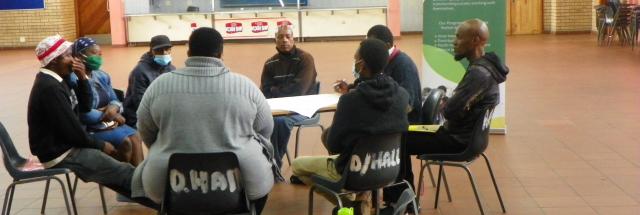Family intergenerational Trustbuilding Dialogue, Diepkloof South Africa
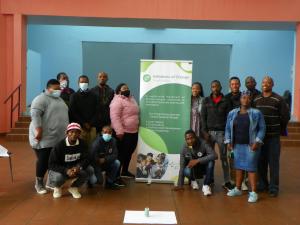 All it takes is a dialogue to bridge a gap between two generations. On the 7th and 8th of December 2021 a Trustbuilding programme dialogue took place in Diepkloof, Soweto where two groups participated in dialogue where they explored the topic 'Healing the historical wounds'.
All it takes is a dialogue to bridge a gap between two generations. On the 7th and 8th of December 2021 a Trustbuilding programme dialogue took place in Diepkloof, Soweto where two groups participated in dialogue where they explored the topic 'Healing the historical wounds'.
The Trustbuilding programme was a follow-up from the COP programme that took place in November 2021. The sessions were four-hours each – which was a chance to look at the progress made on peace in practise challenge and laying further foundations for the Family Trustbuilding dialogue in the future. Participants were encouraged to bring a family member to these dialogues to 'walk' with them on their journey of healing. Brian came with his sister to the dialogue. The sister is from the paternal side of the family whom he recently met for the first time through a long lost absentee father. They used the dialogue as a tool to get to know each other and also understand how they can be there for each other.
The family dialogue, designed to be intergenerational, started after the participants broke into two groups of different ages and gender, one being between the ages of 20-35 years and the other group between the ages of 36 – 56 years. Bennet asked these groups to acknowledge their short comings in the society which leads to the dysfunctions within families. The question posed by the facilitator was, ‘What is it that the older generation needs to acknowledge about the younger generation’s social behaviours and their responsibilities and vice versa?
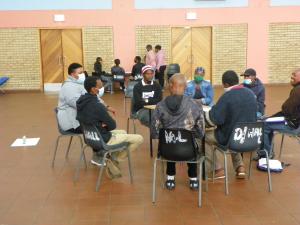
The following are acknowledgments and proposed responsilities that the older generation presented:
- The youth invests in substance abuse
Responsibility: Find creative ways to surpass boredom
- Lack of interest in learning and furthering their studies
Responsibility: Seek and see the many opportunities afforded to them
- Lack of respect
Responsibility: Aspire to have better moral living
Aspire to have better moral living
Responsibility: Self-identity and finding better values
- Lack of self-love
Responsibility: Have a creative space and games to share with the opposite gender
- High level of crime and corruption
Responsibility: Demand less and be patient with life and people
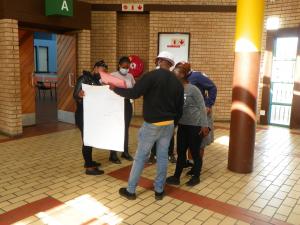 The following are acknowledgments and proposed responsilities that the younger generation presented:
The following are acknowledgments and proposed responsilities that the younger generation presented:
- The elders love to criticize
Responsibility: stop comparing and treat the children equally without discrimination
- The elders are too demanding
Responsibility: Stop being bossy and start acting in a proper manner
- The elders tell lies
Responsibility: Tell the truth and have open conversations
- The elders tell lies
Responsibility: Tell the truth and have open conversations
- The elders want to decide whom we date
Responsibility: Start supporting our decisions and be open to understanding other cultures
- The elders narrow minded about the religious practice
Responsibility: They need to know more on different religions and their roles in society. Let go of false indoctrinations
The younger generation acknowledged their flaws and admitted their mistakes after seeing what the older generation shared in their presentation. They also had the chance to present and what they stressed is the issue of “Parents being too entitled and judging the younger generation’s lifestyle instead of asking to understand and guide.” There was quite an impact when both generations acknowledged what they were doing wrong and how they would now approach it better. “I now see that I have to be understand younger ones regarding how they view the world. I will listen, be supportive and give guidance,” shared Palesa. “I agree with the young ones when they say as parents we are angry and that it’s all from our painful childhood and how we were raised. Now together we need to learn a new way of living in peace and harmony.” said Phakathi.
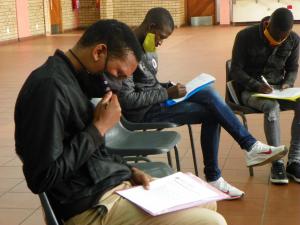
Both groups felt that the common ground for changing the narrative was communication. It was further agreed that in order to fix the broken relationships between the young and the older group, each has to acknowledge their flaws and mistakes. Cleo, one of the facilitators, emphasised that in order to teach the next person how to communicate with you and treat you, you need to show how you want to be treated, you need to talk and live how you want to be treated.
Both groups were happy, grateful and; willing to pass on the teachings to their families and the communities at large. These groups will meet again in the New Year.
Thanks to Sonke Gender Justice, Barona Organisation, Trustbuilding Programme, City of Johannesburg, Masiphephe Network and IofC South Africa for a great teamwork.
Reported by Cleopadia and Karabo

